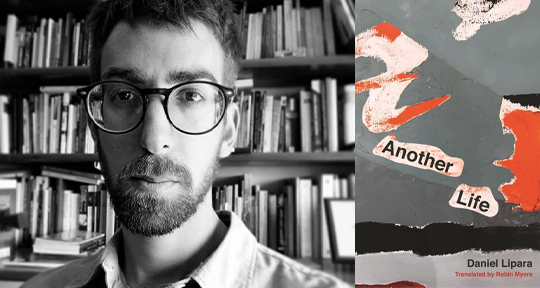Another Life by Daniel Lipara, translated from the Spanish by Robin Myers, Eulialia Books, 2021
The first poem in Daniel Lipara’s debut collection Otra vida, released in English as Another Life (Eulalia Books, 2021), is a page and a half long. Entitled “Susana, lotus flower,” it lasts a lifetime. Many lifetimes. The poem is sweet and painful, excruciating and grotesque, charged with fragility and hope and tenderness and memory (“her father the son of a butcher who fled the pogroms all the way to Argentina”), visceral with pain (“they shrank her stomach with a belt the belt snapped open scratched her innards”), and void of commas. It’s as vivid as it is memorable, and it sets the tone for the rest of the book.
Another Life is a family album laced with beautiful writing; I like to think of the poems as spotless, multichapter vignettes, quickly spun by a well-oiled stereoscope. In Lipara’s ranging collection, we follow a family—a very real and flawed family—moved and motivated by love, grief, and hope, as told to us by a narrator in awe with his surroundings.
After pious aunt Susana of the opening poem, we read about Jorge—the father, “the tiller (. . .) and master griller,” and later Aeolus, the god of the wind. As personal and intimate as Lipara’s work feels, the narrator also becomes preoccupied with what plays out in the greater background, with its history, characters, tales, and myths. In this, Another Life feels both quotidian and epic. Soon after, we meet Liliana, the mother, who is “five foot nine she has big bones and bleach blond hair” and is dying of cancer, though we don’t learn about this until later. (It is hinted at subtly, however, during her first appearance: “(she) lays her hands onto my mother’s vengeful cells.”)
After this introduction, we meet Sai Baba of India; Liliana will travel to his ashram looking to cure her cancer. This journey is first introduced as a premonition: “I dreamed we went to India and your mother was healed,” says Susana. Then we see the family waiting at the airport, on the plane, and reaching Indira Gandhi Airport. We see water buffalos. We see rice fields. We see India through the eyes of a young Daniel, and we see him experiencing the country, silently amazed by its colors, odors, sights, and sounds—again being drawn into the background with its world of fascination, again merging the quotidian and the epic.

